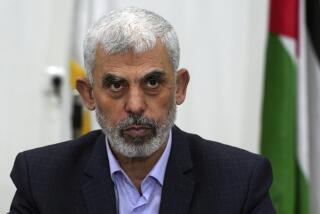With fall of Muslim Brotherhood, is Hamas at risk?

CAIRO -- As the sudden fall of Egypt’s Muslim Brotherhood reverberates through the Middle East, perhaps nowhere are events being watched more anxiously than in Gaza Strip, the seaside enclave controlled by the Islamist group’s Palestinian spinoff, Hamas.
Seeing its Egyptian mentor swept from power after only one year has unnerved many Hamas leaders, despite the group’s tight political and security control over Gaza.
Hamas leaders so far have said little publicly. “The movement does not interfere in Egyptian affairs,” Hamas lawmaker Yahia Moussa said Thursday.
But the ousting Wednesday of Egyptian President Mohamed Morsi was a stinging setback for the Gaza militant group, which lost its most powerful benefactor in a groundswell of public unrest.
Like the Muslim Brotherhood, Hamas has struggled to balance its Islamist and militant roots with the realities and responsibilities of governing. And like its Egyptian brethren, Hamas has been criticized for failing to deliver. Gaza’s 1.5 million residents remain locked in poverty and isolation, in part because Hamas is widely labeled a terrorist organization and isolated by Israel and the much of the West.
Already some Hamas rivals from the Palestinian secular faction Fatah are predicting that Gaza residents also will rise up.
Hamas spokesman Ihab Ghussein insisted the group is not worried, labeling talk of a revolt “ridiculous.”
Still, it’s an abrupt turn of events for Hamas. When Morsi ascended to power a year ago, Hamas leaders were almost giddy, confidently predicting that the Brotherhood’s rise would give them new leverage in confrontations with Israel and Fatah, which is based in the West Bank. They expected that closer ties with a Muslim Brotherhood-controlled Egypt would throw open the Rafah border crossing, end Gaza’s international isolation and keep Israel’s military at bay.
Those hopes never fully materialized, even though relations between Hamas and Egypt improved vastly compared to those seen under former Egyptian President Hosni Mubarak, who viewed Hamas as an enemy.
Morsi surprised many by continuing some of his predecessor’s border restrictions on Gaza, particularly after militants linked to Gaza killed Egyptian security officers in the Sinai Peninsula in August and used the restive desert region as a launching pad to attack Israel.
Morsi’s alliance with Hamas didn’t prevent Israel from launching an eight-day air offensive against Gaza in November, though his intervention may have helped prevent a broader ground invasion.
And despite Egyptian mediation efforts, a reconciliation deal between Hamas and Fatah remains a distant dream.
Morsi and the Muslim Brotherhood also helped protect Hamas from Egypt’s military, which always distrusted the Gaza group. With Morsi’s ousting, Egypt’s military has reasserted itself as the dominant political force in Egypt.
“Hamas is the biggest loser,” said Mukhaimar abu Saada, political science professor at Gaza City’s Al Azhar University. He said Hamas leaders are already concerned that Egypt’s interim government will impose tighter border controls and crack down on smuggling tunnels used to import fuel.
“Don’t forget that the Egyptian opposition views Hamas as a party to the conflict and accuses it of destabilizing the Sinai,” Abu Saada said. “Hamas now fears that the continuing crisis in Egypt will lead to further actions against it.”
Others predict Morsi’s downfall will further radicalize Hamas and sour the group on efforts to bring Western-style democracy to the region. Morsi supporters complain that he was swept away by military force despite being elected.
Hamas likewise has fumed that its 2006 election victory was never accepted by the international community, despite the West’s repeated calls for democratic reforms and nonviolence.
Emboldened by Morsi’s rise, Hamas over the past year had attempted to impose stricter Islamic laws in Gaza, moving to segregate schools by gender, cracking down on women smoking or wearing low-cut jeans and forcing young men into barbershops to change their Western-style haircuts.
Before he was replaced, Morsi was also criticized for spending too much time pursuing a conservative Islamist agenda that did nothing to alleviate economic problems and alienated much of Egypt’s secular and non-Muslim population -- just the accusations that could eventually undermine Hamas’ rule in Gaza.
ALSO:
Russian opposition mayor detained in bribe scandal
Portugal’s government teeters as Europe debates austerity
U.N. says it is unable to provide urgently needed aid near Damascus
Times staff writer Sanders reported from Cairo and special correspondent Abu Alouf from Gaza City.
More to Read
Sign up for Essential California
The most important California stories and recommendations in your inbox every morning.
You may occasionally receive promotional content from the Los Angeles Times.









